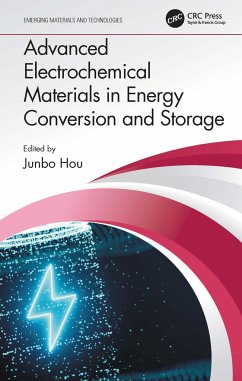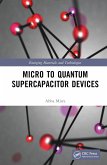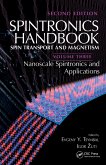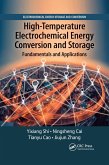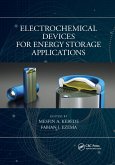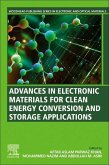Advanced Electrochemical Materials in Energy Conversion and Storage
Herausgeber: Hou, Junbo
Advanced Electrochemical Materials in Energy Conversion and Storage
Herausgeber: Hou, Junbo
- Gebundenes Buch
- Merkliste
- Auf die Merkliste
- Bewerten Bewerten
- Teilen
- Produkt teilen
- Produkterinnerung
- Produkterinnerung
This book focuses on electrochemical energy conversion and storage and introduces novel materials designed for specific energy applications. It presents the relationship of materials properties, processing, and device performance and sheds light on research, development, and deployment of emerging materials and technologies in this field.
Andere Kunden interessierten sich auch für
![Micro to Quantum Supercapacitor Devices Micro to Quantum Supercapacitor Devices]() Abha Misra (Indian Institute of Science, Bangalore, India)Micro to Quantum Supercapacitor Devices122,99 €
Abha Misra (Indian Institute of Science, Bangalore, India)Micro to Quantum Supercapacitor Devices122,99 €![Spintronics Handbook, Second Edition: Spin Transport and Magnetism Spintronics Handbook, Second Edition: Spin Transport and Magnetism]() Spintronics Handbook, Second Edition: Spin Transport and Magnetism64,99 €
Spintronics Handbook, Second Edition: Spin Transport and Magnetism64,99 €![High-Temperature Electrochemical Energy Conversion and Storage High-Temperature Electrochemical Energy Conversion and Storage]() Yixiang ShiHigh-Temperature Electrochemical Energy Conversion and Storage87,99 €
Yixiang ShiHigh-Temperature Electrochemical Energy Conversion and Storage87,99 €![Magnetics, Dielectrics, and Wave Propagation with MATLAB® Codes Magnetics, Dielectrics, and Wave Propagation with MATLAB® Codes]() Carmine Vittoria (Northeastern University, Boston, Massachusetts, UMagnetics, Dielectrics, and Wave Propagation with MATLAB® Codes113,99 €
Carmine Vittoria (Northeastern University, Boston, Massachusetts, UMagnetics, Dielectrics, and Wave Propagation with MATLAB® Codes113,99 €![Polarization Dynamics of Mode-Locked Fiber Lasers Polarization Dynamics of Mode-Locked Fiber Lasers]() Polarization Dynamics of Mode-Locked Fiber Lasers122,99 €
Polarization Dynamics of Mode-Locked Fiber Lasers122,99 €![Electrochemical Devices for Energy Storage Applications Electrochemical Devices for Energy Storage Applications]() Electrochemical Devices for Energy Storage Applications71,99 €
Electrochemical Devices for Energy Storage Applications71,99 €![Advances in Electronic Materials for Clean Energy Conversion and Storage Applications Advances in Electronic Materials for Clean Energy Conversion and Storage Applications]() Advances in Electronic Materials for Clean Energy Conversion and Storage Applications293,99 €
Advances in Electronic Materials for Clean Energy Conversion and Storage Applications293,99 €-
-
-
This book focuses on electrochemical energy conversion and storage and introduces novel materials designed for specific energy applications. It presents the relationship of materials properties, processing, and device performance and sheds light on research, development, and deployment of emerging materials and technologies in this field.
Hinweis: Dieser Artikel kann nur an eine deutsche Lieferadresse ausgeliefert werden.
Hinweis: Dieser Artikel kann nur an eine deutsche Lieferadresse ausgeliefert werden.
Produktdetails
- Produktdetails
- Emerging Materials and Technologies
- Verlag: Taylor & Francis Ltd
- Seitenzahl: 378
- Erscheinungstermin: 31. März 2022
- Englisch
- Abmessung: 161mm x 242mm x 28mm
- Gewicht: 738g
- ISBN-13: 9780367680480
- ISBN-10: 0367680483
- Artikelnr.: 62667396
- Herstellerkennzeichnung
- Libri GmbH
- Europaallee 1
- 36244 Bad Hersfeld
- 06621 890
- Emerging Materials and Technologies
- Verlag: Taylor & Francis Ltd
- Seitenzahl: 378
- Erscheinungstermin: 31. März 2022
- Englisch
- Abmessung: 161mm x 242mm x 28mm
- Gewicht: 738g
- ISBN-13: 9780367680480
- ISBN-10: 0367680483
- Artikelnr.: 62667396
- Herstellerkennzeichnung
- Libri GmbH
- Europaallee 1
- 36244 Bad Hersfeld
- 06621 890
Junbo Hou received his B.S. and M.S. degrees from Harbin Institute of Technology, Harbin, China in 2003 and 2005, respectively, and his Ph.D. degree from Dalian Institute of Chemical Physics, Chinese Academy of Science, Dalian, China in 2008, all in Chemical Engineering, particularly Electrochemical Engineering. From 2008 to 2010, he was with Montanuniversität Leoben and Erich-Schmid-Institut für Materialwissenschaft (ESI), ÖAW, as a Researcher, working on electroceramic materials and high resolution transmission electron microscopy (HRTEM). From 2010 to 2012, he was with Institute of Critical Technology and Applied Science (ICTAS), Virginia Tech, as a Research Scientist, while simultaneously engaged in research work at Department of Mechanical Engineering and Department of Chemistry, Virginia Tech. In 2013, he started working in a startup company SAFCell, Inc of California Institute of Technology (Caltech). In 2016, he was invited to join CEMT as a Chief Scientist responsible for the development and production of proton exchange membrane (PEM) fuel cell engines for vehicles. Since May 2008, he has been Associate Professor at Shanghai Jiao Tong University and has continued to conduct research on fuel cells and batteries. He has published 53 peer-reviewed journal papers and contributed two invited book chapters in the area of electrochemical energy conversion and storage. He also holds 19 Chinese patents. He is currently an Outstanding Scientist of Thousand Talent Program of Zhejiang, China, a member of the National Fuel Cell Standardization Technical Committee, and a member of the APEC Sustainable Energy Center's domestic expert team.
1. Catalyst Support Materials for Proton Exchange Membrane Fuel Cells 2.
Recent Advances in Low PGM for Fuel Cell Electrocatalysis 3. Ultralow Pt
Loading for a Completely New Design of PEM Fuel Cells 4. Outlines for the
Next-Generation Cathode Materials Utilized in Lithium Batteries 5. Cathode
Materials for Lithium-Sulfur Batteries 6. Anode Materials for
Lithium-Sulfur Batteries 7. Interlayer of Lithiun-Sulfur Batteries 8.
Principles and Status of Lithium-Sulfur Batteries 9. Solid-State Batteries
and Interface Issues 10. Key Electrode Materials for Lithium-Ion Capacitor
Batteries 11. Solar-Induced Co2 Electro-Thermochemical Conversion and
Emission Reduction Principles 12. Co2 Electrochemical Reduction to CO: From
Catalysts, Electrodes to Electrolytic Cells and Effect of Operating
Conditions 13. Improving the Electrocatalytic Performance by Defect
Engineering and External Field Regulation
Recent Advances in Low PGM for Fuel Cell Electrocatalysis 3. Ultralow Pt
Loading for a Completely New Design of PEM Fuel Cells 4. Outlines for the
Next-Generation Cathode Materials Utilized in Lithium Batteries 5. Cathode
Materials for Lithium-Sulfur Batteries 6. Anode Materials for
Lithium-Sulfur Batteries 7. Interlayer of Lithiun-Sulfur Batteries 8.
Principles and Status of Lithium-Sulfur Batteries 9. Solid-State Batteries
and Interface Issues 10. Key Electrode Materials for Lithium-Ion Capacitor
Batteries 11. Solar-Induced Co2 Electro-Thermochemical Conversion and
Emission Reduction Principles 12. Co2 Electrochemical Reduction to CO: From
Catalysts, Electrodes to Electrolytic Cells and Effect of Operating
Conditions 13. Improving the Electrocatalytic Performance by Defect
Engineering and External Field Regulation
1. Catalyst Support Materials for Proton Exchange Membrane Fuel Cells 2.
Recent Advances in Low PGM for Fuel Cell Electrocatalysis 3. Ultralow Pt
Loading for a Completely New Design of PEM Fuel Cells 4. Outlines for the
Next-Generation Cathode Materials Utilized in Lithium Batteries 5. Cathode
Materials for Lithium-Sulfur Batteries 6. Anode Materials for
Lithium-Sulfur Batteries 7. Interlayer of Lithiun-Sulfur Batteries 8.
Principles and Status of Lithium-Sulfur Batteries 9. Solid-State Batteries
and Interface Issues 10. Key Electrode Materials for Lithium-Ion Capacitor
Batteries 11. Solar-Induced Co2 Electro-Thermochemical Conversion and
Emission Reduction Principles 12. Co2 Electrochemical Reduction to CO: From
Catalysts, Electrodes to Electrolytic Cells and Effect of Operating
Conditions 13. Improving the Electrocatalytic Performance by Defect
Engineering and External Field Regulation
Recent Advances in Low PGM for Fuel Cell Electrocatalysis 3. Ultralow Pt
Loading for a Completely New Design of PEM Fuel Cells 4. Outlines for the
Next-Generation Cathode Materials Utilized in Lithium Batteries 5. Cathode
Materials for Lithium-Sulfur Batteries 6. Anode Materials for
Lithium-Sulfur Batteries 7. Interlayer of Lithiun-Sulfur Batteries 8.
Principles and Status of Lithium-Sulfur Batteries 9. Solid-State Batteries
and Interface Issues 10. Key Electrode Materials for Lithium-Ion Capacitor
Batteries 11. Solar-Induced Co2 Electro-Thermochemical Conversion and
Emission Reduction Principles 12. Co2 Electrochemical Reduction to CO: From
Catalysts, Electrodes to Electrolytic Cells and Effect of Operating
Conditions 13. Improving the Electrocatalytic Performance by Defect
Engineering and External Field Regulation

